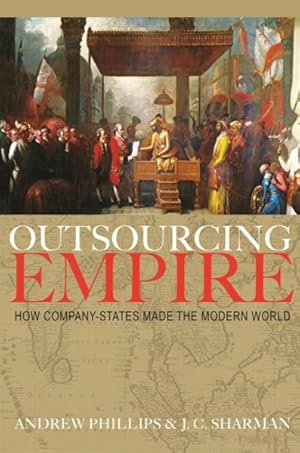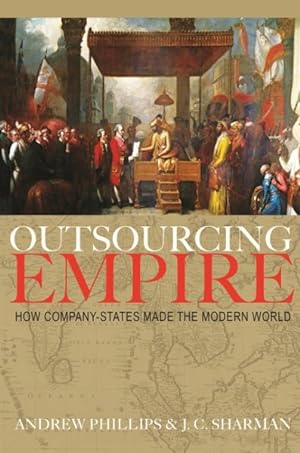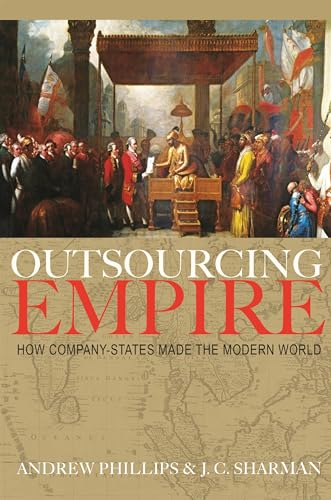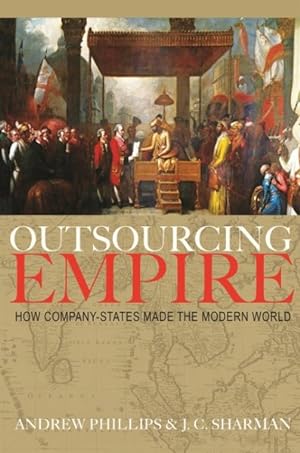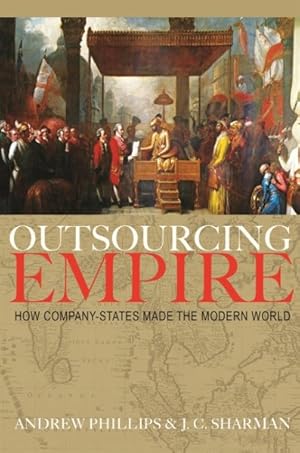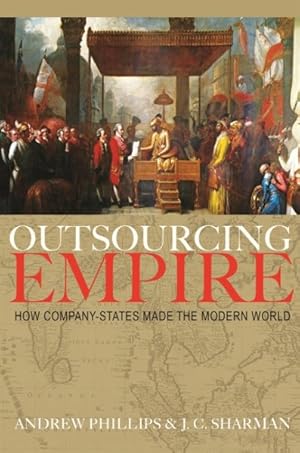Phillips Andrew Sharman (47 results)
FeedbackSearch filters
Product Type
- All Product Types
- Books (47)
- Magazines & Periodicals (No further results match this refinement)
- Comics (No further results match this refinement)
- Sheet Music (No further results match this refinement)
- Art, Prints & Posters (No further results match this refinement)
- Photographs (No further results match this refinement)
- Maps (No further results match this refinement)
- Manuscripts & Paper Collectibles (No further results match this refinement)
Condition Learn more
- New (36)
- As New, Fine or Near Fine (9)
- Very Good or Good (2)
- Fair or Poor (No further results match this refinement)
- As Described (No further results match this refinement)
Binding
Collectible Attributes
- First Edition (1)
- Signed (No further results match this refinement)
- Dust Jacket (2)
- Seller-Supplied Images (22)
- Not Print on Demand (44)
Language (2)
Free Shipping
Seller Location
Seller Rating
-
Outsourcing Empire : How Company-states Made the Modern World
Published by Princeton University Press, 2022
ISBN 10: 0691206198 ISBN 13: 9780691206196
Language: English
Seller: GreatBookPrices, Columbia, MD, U.S.A.
Condition: As New. Unread book in perfect condition.
-
Outsourcing Empire: How Company-States Made the Modern World Format: Paperback
Published by Princeton University Press, 2022
ISBN 10: 0691206198 ISBN 13: 9780691206196
Language: English
Seller: INDOO, Avenel, NJ, U.S.A.
Condition: As New. Unread copy in mint condition.
-
Outsourcing Empire : How Company-states Made the Modern World
Published by Princeton University Press, 2022
ISBN 10: 0691206198 ISBN 13: 9780691206196
Language: English
Seller: GreatBookPrices, Columbia, MD, U.S.A.
Condition: New.
-
Outsourcing Empire
Published by Princeton University Press, US, 2022
ISBN 10: 0691206198 ISBN 13: 9780691206196
Language: English
Seller: Rarewaves USA, OSWEGO, IL, U.S.A.
Paperback. Condition: New. How chartered company-states spearheaded European expansion and helped create the world's first genuinely global orderFrom Spanish conquistadors to British colonialists, the prevailing story of European empire-building has focused on the rival ambitions of competing states. But as Outsourcing Empire shows, from the seventeenth to the twentieth centuries, company-states-not sovereign states-drove European expansion, building the world's first genuinely international system. Company-states were hybrid ventures: pioneering multinational trading firms run for profit, with founding charters that granted them sovereign powers of war, peace, and rule. Those like the English and Dutch East India Companies carved out corporate empires in Asia, while other company-states pushed forward European expansion through North America, Africa, and the South Pacific. In this comparative exploration, Andrew Phillips and J. C. Sharman explain the rise and fall of company-states, why some succeeded while others failed, and their role as vanguards of capitalism and imperialism.In dealing with alien civilizations to the East and West, Europeans relied primarily on company-states to mediate geographic and cultural distances in trade and diplomacy. Emerging as improvised solutions to bridge the gap between European rulers' expansive geopolitical ambitions and their scarce means, company-states succeeded best where they could balance the twin imperatives of power and profit. Yet as European states strengthened from the late eighteenth century onward, and a sense of separate public and private spheres grew, the company-states lost their usefulness and legitimacy.Bringing a fresh understanding to the ways cross-cultural relations were handled across the oceans, Outsourcing Empire examines the significance of company-states as key progenitors of the globalized world.
-
International Order in Diversity: War, Trade and Rule in the Indian Ocean
Published by Cambridge University Press, 2015
ISBN 10: 1107446821 ISBN 13: 9781107446823
Language: English
Seller: ThriftBooks-Atlanta, AUSTELL, GA, U.S.A.
Paperback. Condition: Very Good. No Jacket. May have limited writing in cover pages. Pages are unmarked. ~ ThriftBooks: Read More, Spend Less 1.07.
-
Outsourcing Empire: How Company-States Made the Modern World
Published by Princeton University Press, 2020
ISBN 10: 0691203512 ISBN 13: 9780691203515
Language: English
Seller: SecondSale, Montgomery, IL, U.S.A.
Condition: Good. Item in good condition. Textbooks may not include supplemental items i.e. CDs, access codes etc.
-
Outsourcing Empire: How Company-State Made the Modern World
Published by Princeton University Press, 2020
ISBN 10: 0691203512 ISBN 13: 9780691203515
Language: English
Seller: M.S. Books, Salisbury, MD, U.S.A.
First Edition
Hardcover. Condition: Fine. Dust Jacket Condition: Fine. 1st Edition. First Edition, First Printing of this study of Colonial era company-states such as the Dutch East India Company, commercial enterprises operating with great autonomy in regions far from their home countries and serving as key instruments in facilitating European colonialism. 253 pages. No sign of previous use.
-
Outsourcing Empire: How Company-States Made the Modern World
Published by Princeton University Press, 2022
ISBN 10: 0691206198 ISBN 13: 9780691206196
Language: English
Seller: Majestic Books, Hounslow, United Kingdom
£ 20.87
Convert currency£ 6.50 shipping from United Kingdom to U.S.A.Quantity: 3 available
Add to basketCondition: New.
-
Outsourcing Empire: How Company-States Made the Modern World
Published by Princeton University Press, 2022
ISBN 10: 0691206198 ISBN 13: 9780691206196
Language: English
Seller: Books Puddle, New York, NY, U.S.A.
Condition: New.
-
International Order in Diversity
Published by Cambridge University Press CUP, 2015
ISBN 10: 1107446821 ISBN 13: 9781107446823
Language: English
Seller: Books Puddle, New York, NY, U.S.A.
Condition: New. pp. 274, 9 Maps.
-
Outsourcing Empire: How Company-States Made the Modern World
Published by Princeton University Press, 2022
ISBN 10: 0691206198 ISBN 13: 9780691206196
Language: English
Seller: Ria Christie Collections, Uxbridge, United Kingdom
£ 19.88
Convert currency£ 11.98 shipping from United Kingdom to U.S.A.Quantity: Over 20 available
Add to basketCondition: New. In.
-
Outsourcing Empire : How Company-states Made the Modern World
Published by Princeton University Press, 2022
ISBN 10: 0691206198 ISBN 13: 9780691206196
Language: English
Seller: GreatBookPricesUK, Woodford Green, United Kingdom
£ 17.06
Convert currency£ 15 shipping from United Kingdom to U.S.A.Quantity: Over 20 available
Add to basketCondition: New.
-
International Order in Diversity
Published by Cambridge University Press, 2015
ISBN 10: 1107446821 ISBN 13: 9781107446823
Language: English
Seller: Majestic Books, Hounslow, United Kingdom
£ 27.51
Convert currency£ 6.50 shipping from United Kingdom to U.S.A.Quantity: 1 available
Add to basketCondition: New. pp. 274 9 Maps.
-
Outsourcing Empire: How Company-States Made the Modern World
Published by Princeton University Press, 2022
ISBN 10: 0691206198 ISBN 13: 9780691206196
Language: English
Seller: Biblios, Frankfurt am main, HESSE, Germany
Condition: New.
-
Outsourcing Empire : How Company-States Made the Modern World
Published by Princeton University Press, 2020
ISBN 10: 0691203512 ISBN 13: 9780691203515
Language: English
Seller: GreatBookPrices, Columbia, MD, U.S.A.
Condition: New.
-
Outsourcing Empire : How Company-States Made the Modern World
Published by Princeton University Press, 2020
ISBN 10: 0691203512 ISBN 13: 9780691203515
Language: English
Seller: GreatBookPrices, Columbia, MD, U.S.A.
Condition: As New. Unread book in perfect condition.
-
Outsourcing Empire
Published by Princeton University Press, US, 2020
ISBN 10: 0691203512 ISBN 13: 9780691203515
Language: English
Seller: Rarewaves USA, OSWEGO, IL, U.S.A.
Hardback. Condition: New. How chartered company-states spearheaded European expansion and helped create the world's first genuinely global orderFrom Spanish conquistadors to British colonialists, the prevailing story of European empire-building has focused on the rival ambitions of competing states. But as Outsourcing Empire shows, from the seventeenth to the twentieth centuries, company-states-not sovereign states-drove European expansion, building the world's first genuinely international system. Company-states were hybrid ventures: pioneering multinational trading firms run for profit, with founding charters that granted them sovereign powers of war, peace, and rule. Those like the English and Dutch East India Companies carved out corporate empires in Asia, while other company-states pushed forward European expansion through North America, Africa, and the South Pacific. In this comparative exploration, Andrew Phillips and J. C. Sharman explain the rise and fall of company-states, why some succeeded while others failed, and their role as vanguards of capitalism and imperialism.In dealing with alien civilizations to the East and West, Europeans relied primarily on company-states to mediate geographic and cultural distances in trade and diplomacy. Emerging as improvised solutions to bridge the gap between European rulers' expansive geopolitical ambitions and their scarce means, company-states succeeded best where they could balance the twin imperatives of power and profit. Yet as European states strengthened from the late eighteenth century onward, and a sense of separate public and private spheres grew, the company-states lost their usefulness and legitimacy.Bringing a fresh understanding to the ways cross-cultural relations were handled across the oceans, Outsourcing Empire examines the significance of company-states as key progenitors of the globalized world.
-
Outsourcing Empire How CompanyStates Made the Modern World
Seller: Revaluation Books, Exeter, United Kingdom
£ 19.20
Convert currency£ 25 shipping from United Kingdom to U.S.A.Quantity: 2 available
Add to basketPaperback. Condition: Brand New. 272 pages. 6.12x9.25x0.79 inches. In Stock.
-
Outsourcing Empire: How Company-States Made the Modern World
Published by Princeton University Press, 2020
ISBN 10: 0691203512 ISBN 13: 9780691203515
Language: English
Seller: Books Puddle, New York, NY, U.S.A.
Condition: New.
-
Outsourcing Empire: How Company-States Made the Modern World
Published by Princeton University Press, 2020
ISBN 10: 0691203512 ISBN 13: 9780691203515
Language: English
Seller: Majestic Books, Hounslow, United Kingdom
£ 42.95
Convert currency£ 6.50 shipping from United Kingdom to U.S.A.Quantity: 1 available
Add to basketCondition: New.
-
Outsourcing Empire
Published by Princeton University Press, US, 2020
ISBN 10: 0691203512 ISBN 13: 9780691203515
Language: English
Seller: Rarewaves.com USA, London, LONDO, United Kingdom
£ 51.64
Convert currencyFree shipping from United Kingdom to U.S.A.Quantity: Over 20 available
Add to basketHardback. Condition: New. How chartered company-states spearheaded European expansion and helped create the world's first genuinely global orderFrom Spanish conquistadors to British colonialists, the prevailing story of European empire-building has focused on the rival ambitions of competing states. But as Outsourcing Empire shows, from the seventeenth to the twentieth centuries, company-states-not sovereign states-drove European expansion, building the world's first genuinely international system. Company-states were hybrid ventures: pioneering multinational trading firms run for profit, with founding charters that granted them sovereign powers of war, peace, and rule. Those like the English and Dutch East India Companies carved out corporate empires in Asia, while other company-states pushed forward European expansion through North America, Africa, and the South Pacific. In this comparative exploration, Andrew Phillips and J. C. Sharman explain the rise and fall of company-states, why some succeeded while others failed, and their role as vanguards of capitalism and imperialism.In dealing with alien civilizations to the East and West, Europeans relied primarily on company-states to mediate geographic and cultural distances in trade and diplomacy. Emerging as improvised solutions to bridge the gap between European rulers' expansive geopolitical ambitions and their scarce means, company-states succeeded best where they could balance the twin imperatives of power and profit. Yet as European states strengthened from the late eighteenth century onward, and a sense of separate public and private spheres grew, the company-states lost their usefulness and legitimacy.Bringing a fresh understanding to the ways cross-cultural relations were handled across the oceans, Outsourcing Empire examines the significance of company-states as key progenitors of the globalized world.
-
Outsourcing Empire : How Company-States Made the Modern World
Published by Princeton University Press, 2020
ISBN 10: 0691203512 ISBN 13: 9780691203515
Language: English
Seller: GreatBookPricesUK, Woodford Green, United Kingdom
£ 35.76
Convert currency£ 15 shipping from United Kingdom to U.S.A.Quantity: 2 available
Add to basketCondition: New.
-
International Order in Diversity: War, Trade and Rule in the Indian Ocean
Seller: Revaluation Books, Exeter, United Kingdom
£ 26.21
Convert currency£ 25 shipping from United Kingdom to U.S.A.Quantity: 1 available
Add to basketPaperback. Condition: Brand New. 276 pages. 8.75x5.75x0.50 inches. In Stock.
-
Outsourcing Empire: How Company-States Made the Modern World
Published by Princeton University Press, 2020
ISBN 10: 0691203512 ISBN 13: 9780691203515
Language: English
Seller: Biblios, Frankfurt am main, HESSE, Germany
Condition: New.
-
Outsourcing Empire: How Company-States Made the Modern World
Published by Princeton University Press, 2020
ISBN 10: 0691203512 ISBN 13: 9780691203515
Language: English
Seller: Ria Christie Collections, Uxbridge, United Kingdom
£ 42.39
Convert currency£ 11.98 shipping from United Kingdom to U.S.A.Quantity: Over 20 available
Add to basketCondition: New. In.
-
Outsourcing Empire : How Company-States Made the Modern World
Published by Princeton University Press, 2020
ISBN 10: 0691203512 ISBN 13: 9780691203515
Language: English
Seller: GreatBookPricesUK, Woodford Green, United Kingdom
£ 41.48
Convert currency£ 15 shipping from United Kingdom to U.S.A.Quantity: 2 available
Add to basketCondition: As New. Unread book in perfect condition.
-
Outsourcing Empire
Published by Princeton University Press, US, 2022
ISBN 10: 0691206198 ISBN 13: 9780691206196
Language: English
Seller: Rarewaves USA United, OSWEGO, IL, U.S.A.
Paperback. Condition: New. How chartered company-states spearheaded European expansion and helped create the world's first genuinely global orderFrom Spanish conquistadors to British colonialists, the prevailing story of European empire-building has focused on the rival ambitions of competing states. But as Outsourcing Empire shows, from the seventeenth to the twentieth centuries, company-states-not sovereign states-drove European expansion, building the world's first genuinely international system. Company-states were hybrid ventures: pioneering multinational trading firms run for profit, with founding charters that granted them sovereign powers of war, peace, and rule. Those like the English and Dutch East India Companies carved out corporate empires in Asia, while other company-states pushed forward European expansion through North America, Africa, and the South Pacific. In this comparative exploration, Andrew Phillips and J. C. Sharman explain the rise and fall of company-states, why some succeeded while others failed, and their role as vanguards of capitalism and imperialism.In dealing with alien civilizations to the East and West, Europeans relied primarily on company-states to mediate geographic and cultural distances in trade and diplomacy. Emerging as improvised solutions to bridge the gap between European rulers' expansive geopolitical ambitions and their scarce means, company-states succeeded best where they could balance the twin imperatives of power and profit. Yet as European states strengthened from the late eighteenth century onward, and a sense of separate public and private spheres grew, the company-states lost their usefulness and legitimacy.Bringing a fresh understanding to the ways cross-cultural relations were handled across the oceans, Outsourcing Empire examines the significance of company-states as key progenitors of the globalized world.
-
£ 22.20
Convert currency£ 42.54 shipping from Germany to U.S.A.Quantity: Over 20 available
Add to basketKartoniert / Broschiert. Condition: New. Über den AutorAndrew Phillips and J. C. Sharman.
-
Outsourcing Empire : How Company-states Made the Modern World
Published by Princeton University Press, 2022
ISBN 10: 0691206198 ISBN 13: 9780691206196
Language: English
Seller: GreatBookPricesUK, Woodford Green, United Kingdom
£ 61.75
Convert currency£ 15 shipping from United Kingdom to U.S.A.Quantity: Over 20 available
Add to basketCondition: As New. Unread book in perfect condition.
-
Outsourcing Empire
Published by Princeton University Press, US, 2020
ISBN 10: 0691203512 ISBN 13: 9780691203515
Language: English
Seller: Rarewaves USA United, OSWEGO, IL, U.S.A.
Hardback. Condition: New. How chartered company-states spearheaded European expansion and helped create the world's first genuinely global orderFrom Spanish conquistadors to British colonialists, the prevailing story of European empire-building has focused on the rival ambitions of competing states. But as Outsourcing Empire shows, from the seventeenth to the twentieth centuries, company-states-not sovereign states-drove European expansion, building the world's first genuinely international system. Company-states were hybrid ventures: pioneering multinational trading firms run for profit, with founding charters that granted them sovereign powers of war, peace, and rule. Those like the English and Dutch East India Companies carved out corporate empires in Asia, while other company-states pushed forward European expansion through North America, Africa, and the South Pacific. In this comparative exploration, Andrew Phillips and J. C. Sharman explain the rise and fall of company-states, why some succeeded while others failed, and their role as vanguards of capitalism and imperialism.In dealing with alien civilizations to the East and West, Europeans relied primarily on company-states to mediate geographic and cultural distances in trade and diplomacy. Emerging as improvised solutions to bridge the gap between European rulers' expansive geopolitical ambitions and their scarce means, company-states succeeded best where they could balance the twin imperatives of power and profit. Yet as European states strengthened from the late eighteenth century onward, and a sense of separate public and private spheres grew, the company-states lost their usefulness and legitimacy.Bringing a fresh understanding to the ways cross-cultural relations were handled across the oceans, Outsourcing Empire examines the significance of company-states as key progenitors of the globalized world.


